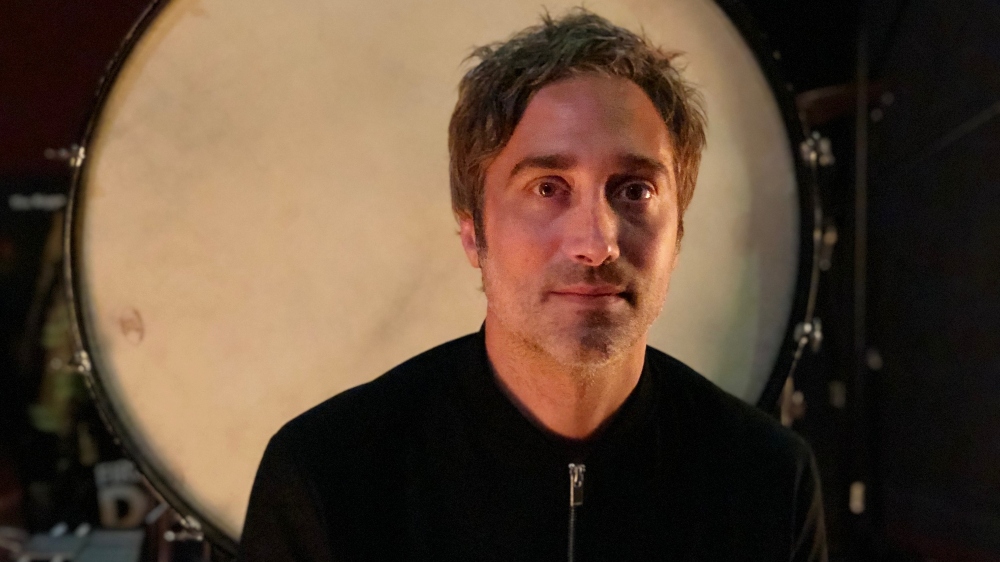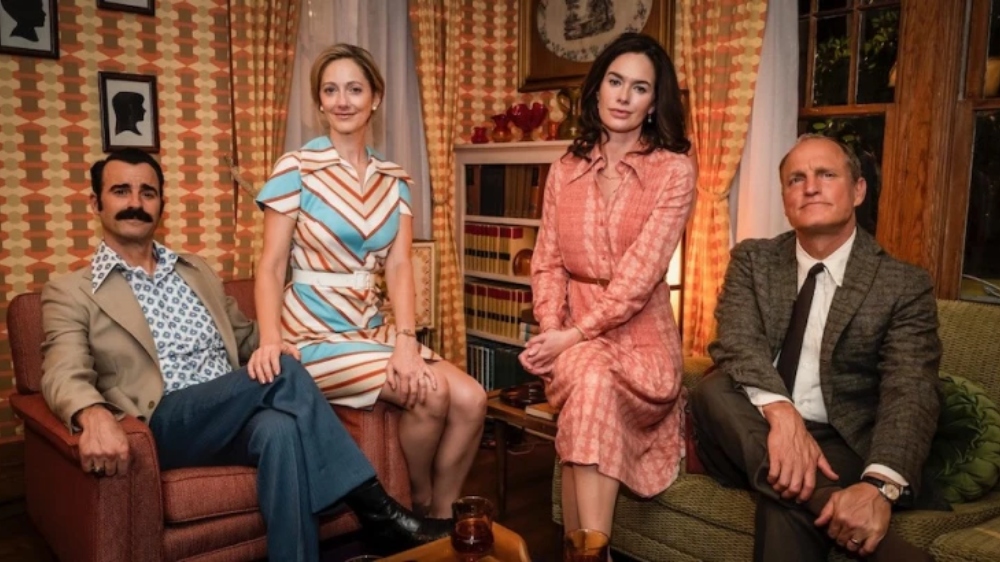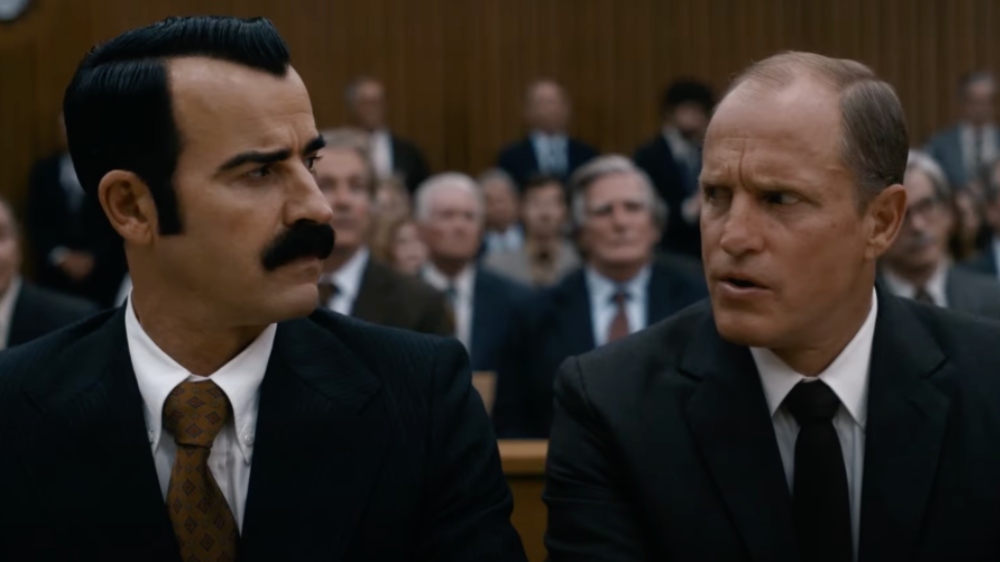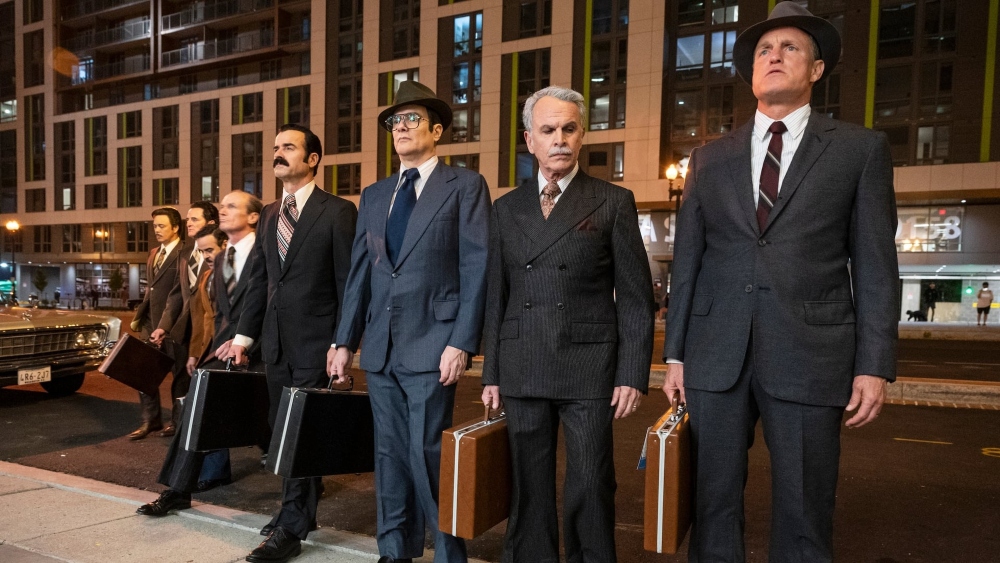Over the past two decades, composer Jeff Cardoni has been a part of many movies and TV series featuring memorable music, beginning with Season 2 of CSI: Miami and leading up to his current stint on Young Sheldon. ASCAP even voted him TV Composer of the Year in 2019.
Now, Cardoni is scoring White House Plumbers, HBO’s new limited series about the spectacularly unbelievable exploits of Watergate participants E. Howard Hunt (Woody Harrelson) and G. Gordon Liddy (Justin Theroux).
Below the Line spoke with Cardoni about the challenge of having the show’s tone change over the course of its five episodes and what that process demanded of him. He also emphasized that he was writing music for a drama, even if what was happening on-screen may have been funny.
That’s been a recurring theme over the course of Cardoni’s impressive career, as he has also added some dramatic flair to comedic series like Ghosts and The Kominsky Method. The composer’s range and flexibility have helped keep him in business for the past 20 years, ever since he got his big break on CBS’ sunny CSI spinoff, and in the below interview, he also revisited some his past work that he felt was underappreciated, such as his cues for Rob Lowe‘s short-lived series The Grinder.

Below the Line: How much were you aware of the real-life events that inspired this show?
Jeff Cardoni: I thought I was pretty aware, but a lot of things I apparently didn’t know. You knew the gist of it. This show looks at some different characters from a different angle than the other ones have, but we all know the big picture, sure.
BTL: A five-episode limited series presents a cool opportunity because it’s a good length. What was the approach you took to tackle those different episodes?
Cardoni: I just approached it like a five-hour movie. They were all shot and being edited at the same time. When I came on board, everything was already put together. I was literally working on every episode at the same time. It was kind of overwhelming because it was like a five-hour movie. It was like two-and-a-half movies and I had six weeks. It was a little hairy.
BTL: Each episode takes on a different focus and your music follows that.
Cardoni: Honestly, I’m trying to think. I never really had a show like this, where it changes tone over the arc of the show. The break-in is in Episode 3. Up until Episode 3, it’s a little lighter, a little more heist-y. And then it just goes downhill fast, so the last two episodes are super dark and emotional. That was hard. I had never really dealt with that before where you had to find this tone that could morph and expand through the whole story. There wasn’t a sound and it stayed the sound through all the episodes. That was a challenge and a fun puzzle.
BTL: Was there a template or inspiration that you took for those episodes and then the later ones?
Cardoni: No, it was really trial and error. When I first talked to [EP/Director] David Mandel, I wrote some demos to try to get this job. I was thinking [of Composer] David Shire and some of the great classic ’70s thrillers like All the President’s Men. I was listening to a lot of [Lalo] Schifrin. There was never really any direction in that way. It was more that David wanted it to be a modernized version of a ’70s political thriller. Just a lot of trial and error until we came up with stuff that worked, and had the raw material that I could expand on as the series progressed — from the light stuff to the super dark, heavy stuff.

BTL: Did you work on it in that order, light to heavy?
Cardoni: Yeah. We went through all the episodes, but the problem was that, once I got a first pass of all the episodes, then it was like, “Change that cue in that episode.” It was this constantly moving puzzle of pieces that would change. When something would change earlier, that would affect what would happen later. I thought I was going to have a nervous breakdown trying to keep track of it all. It was intense. But it’s gratifying to have made it through. It was fun.
BTL: Was the music character-driven?
Cardoni: Very much so. I’m super old-fashioned in themes and melodies and stuff. There’s an overall theme for Hunt and Liddy, then there’s another theme for Liddy, the first time we see him. And then there’s the family theme since the show is a lot about those relationships. There’s Dorothy’s theme, which becomes the Hunt family theme. They go through the episode and expand in sound as they go.
BTL: What instruments did you know you wanted to incorporate into your music?
Cardoni: It’s all pretty much acoustic instrument based. In the beginning, there’s a lot of ’70s, with clarinet and flute and Rhodes piano, Hammond organ, [and a] drum set. And then I had a small string section, and small brass for the first three episodes. It was like 17 people. But then as it got heavier after the trial, then we got a 52-piece orchestra. It seemed like the sound had to expand as it got from heist-y to people dying. That was what I tried to do; make the sound grow in weight as the episodes went on. All the percussion in the first few episodes is bongos and drum sets — the stuff you’d think. After the break-in and they start going to jail, the percussion gets a lot more distorted. There are bass drums going through foot pedals so it’s really blown out. The stakes keep getting heavier, and the tone keeps getting heavier as it goes through.
BTL: Were there any COVID safety protocols in place that made this particularly challenging?
Cardoni: By this point, I’m so used to them, [so] not really. The safety protocol is that the showrunner, Dave, hadn’t taken his mask off in years. I was, at that point, ready to not care anymore. But it was weird because the orchestra still wears the masks in L.A., but in Budapest, they do not. When I was conducting, I forgot and I didn’t have a mask on. In hindsight, they’re probably looking at me like I’m a jerk for not having a mask on. After the years we’ve all been through, I’m just over it at this point.

BTL: As you mentioned, this is a story we’ve seen before in other forms. Gaslit just came out last year — did you watch that show or try to avoid it?
Cardoni: I stayed away. In fact, I did a panel, and Matt Quayle, who did Gaslit, was on it. I did not watch it at all, because I didn’t want to emulate what he did. I have no idea what he did. It was really in a bubble, this whole thing. I think White House Plumbers actually started shooting before Gaslit. It just took so long to get to the screen. I think it’s [been] three years. They had the premiere recently and he said they started shooting something like three years ago. It’s crazy. Their whole pitch is that it’s told from a different perspective. It’s more about the Hunt-Liddy relationship. They tried to break in four times before they actually broke in, which I did not know. So they were bumbling idiots. It’s a miracle that they pulled [it] off.
[White House Plumbers] was about showing the toll it took on these people, that they thought their love of country was so important that they basically gave up their families and gave up their lives for what turned out to not even matter because he won the election by way more than he needed to. So it was totally unnecessary. It was really to show the downfall of their personal lives more than the actual break-in itself, which everyone knows the story.
BTL: It’s definitely a fun show, which I’m not sure it should be, given that it’s serious history and we probably shouldn’t be laughing.
Cardoni: I approached it as a drama and tried not to make anything funny. But the dialogue, some of it is pretty damn funny. I forgot about some of the stuff, like, in the first episode, there was the thing with the walkie-talkies where people were going nuts at the premiere. It’s just so in the drama of it all that I forgot, it’s really funny. They can’t call each other on the walkie-talkies when they’re trying to break in. People were going nuts. It was cool to see.
BTL: Looking at your resume, there are a lot of cool shows on there, including sitcoms like How I Met Your Father and Ghosts. And a short-lived show, The Grinder!
Cardoni: Oh! I have a soft spot for The Grinder. That was canceled way too soon. That was so much fun to do. The music was so over-the-top, which you so rarely get to do. Yeah, that was a blast. It was so unique, too. I was so bummed that didn’t make it. But you just never know. I never set out to do comedies. It’s kind of weird. I think Silicon Valley changed the trajectory, and unexpectedly, because [in] Silicon Valley, the music is not funny at all. It’s like a thriller. But I got a lot of calls for comedies after that, so who knows?
BTL: I think about shows like Silicon Valley and Ghosts, and I can hear the music just picturing them. Some of it is just repeated cues, but that’s part of what makes these comedic shows grounded in a different way. You’re not doing the comedy or adding a laugh track of music.
Cardoni: I’m really glad you noticed that, because I fight so hard to not score comedically. Ghosts especially. I have a blast doing Ghosts. I do my own Danny Elfman movie every week. I try to just write this big, gothic orchestral music that’s fun to do. They just let me do whatever I want! It’s so rare. I get the episode, I write it front to back. I don’t have to listen to temp music. It’s a rarity. So it’s a lot of fun, because I think, a lot of times, you get micromanaged and noted so much that you’re just writing out of defense, whereas on Ghosts, I could dream up anything.
Some weeks, I’m like, ‘I’m going to see how far I can push it. I’m going to push it until they give me a note on something. I’m going to do this arpeggio in 5:4 just to see what happens.’ Knock on wood, they just buy what I’m selling. It’s a joy and a rarity. I’m really glad it found some success too, because I thought it was so out there with the pilot. I thought, there’s no way this is going to go on network TV. I never saw the original show either, so I don’t know what they do on there.

BTL: I love Wilfred too, and that’s another one where the music guides it so much because some of it is legitimately disturbing, and some of it is just weird.
Cardoni: That’s another one! That music was not funny at all. In my head, I’m always like, “if I listened to this music and didn’t know what show it was for, would I think it’s a sitcom?” I really hope, with 99 percent of them, I don’t think you would find that. I was doing this movie about a dog a few years ago, but the music was this super intense orchestral music. After the one break, someone said something, someone in the orchestra, and they’re like, ‘I had no idea that was a kid’s movie about a dog,’ and I was like, ‘That felt good.’ I think the audience is intelligent, kids especially. I don’t think the music has to play down to people. My six and nine-year-olds are watching some ridiculously intense music movies with music that’s amazing, and it’s not kiddie music. I think the audience is pretty sophisticated.
BTL: In terms of sophistication, I think The Kominsky Method has a real sense of nostalgia embedded within it. I can picture them walking through that restaurant they go to every single day as soon as I think of the music.
Cardoni: Oh yeah, that was a blast to do. That was a weird one. Chuck Lorre, he’’ on Young Sheldon too, but I don’t deal with him that much. I got a call one day that said Chuck Lorre, and I was like, I never get a call from Chuck Lorre. So I picked up the phone, and it was Chuck’s assistant — ‘I have Chuck for you.’ He got on, and I was like, “Am I fired? Am I in trouble?” He’s like, ‘no, quite the contrary. I’ve got this show, and I want you to come take a look.’ I was like, ‘Wow!’ I didn’t know if he really paid attention to anything I did, so it was cool.
When I saw the first episode, I was just like, ‘Oh my god, it’s so good.’ Chuck came from the multi-cam world, so he didn’t really understand single-cam scoring. It was a process, but he was really open and super nuanced and intelligent. It was a challenge but also I’m super proud of what we ended up with. He was always open to trying things. There’s not a ton of music, but I think it meant something when there was. I’d rather do that than just slather music all over the place because I think it just loses its effect.
BTL: You have the most credits for one particular show: CSI: Miami.
Cardoni: That was my first real big break. At that point, in 2003, I was so broke and almost out of town. I was living at a hotel by the airport in a parking lot by a strip club and a Denny’s. I was pretty much on the way out, and I got a chance to demo for that because Graeme Revell was leaving. The music supervisor Jason Alexander, who’s a friend of mine, said, ‘Do you want to take a shot at demoing this?’ I was like, “There’s no way in hell they’re going to go from Graeme to me.” I was [a] nobody. But I just got super lucky and they picked my demo.
I was sitting by the Denny’s in the parking lot and got the call that I got the gig and could I come in. It was like a movie moment. The greatest thing was, the next day I could go to Starbucks and not have to check my debit card to see if there was enough money on it. I was near the end. That was a trip. That was a great run. I’ll probably never have something that goes that long again. 200 episodes, which was crazy.
BTL: Chuck Lorre seems pretty popular, so you never know.
Cardoni: Yeah, I guess Young Sheldon is on Season 7, so who knows?
White House Plumbers is now airing on HBO and streaming on HBO Max.





